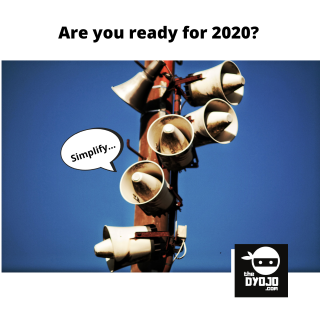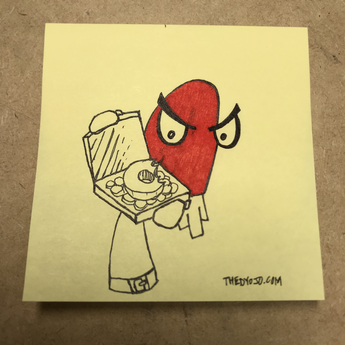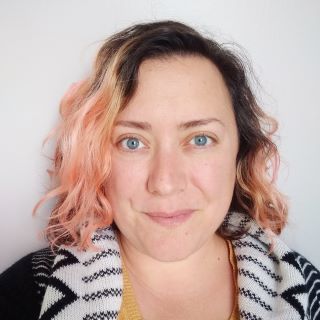Build momentum toward reaching your goals by simplifying your vision process. How many times have you been asked, “Where do you see yourself in five years?” While it seems like a silly question when you are applying for an entry level job flipping burgers, or any job for that matter, it is one that can be helpful for your personal development. Where do you want to be in five years? Do you have a vision for your professional life trajectory? Hellen Keller was born both deaf and blind but refused to allow those major setbacks to define her. Her words and example are an inspiration as well as a kick in the butt when she says, “The only thing worse than being blind is having sight but no vision.” Start with what isn’t. If it isn’t enough that 2020 is trying to slap you in the face, you’ve just been called out by Hellen Keller. Before you despair, let us help you simplify your pursuit of a clear vision by ruling out those items that are not critical to being purpose driven. Having vision is not about seeing the future. You are not required to be a fortune teller or a practicing daytime television psychic in order to have vision for your future. We are enamored with the false idea that only the special can thrive. Do not buy into the concept that in order to be an effective leader you have to also be a seer of the unknown. Do you heap pressures upon yourself by believing it is your job to think about what will change in the coming year so that you can seize upon those opportunities? By contrast, Amazon CEO Jeff Bezos finds it helpful to ask, “What won’t change.” He knows that customers will always want lower prices, wider selection and faster delivery. These expectations are a constant. Jeff knows he will never have a customer come to him and say, "Jeff, I love Amazon; I just wish the prices were a little higher. I love Amazon; I just wish you'd deliver a little more slowly."
Change is a constant, adapt. While it serves purpose well to ask yourself, what won’t change as opposed to worrying about what will change, this does not mean that we aren’t required to adapt. Jack Welch is viewed by many as the key figure in General Electric’s reportedly 4,000% growth during his tenure as CEO from 1981-2001. He speaks often on the importance of leaders creating clarity in vision, structuring the processes around purpose and seeing things through to completion. Two decades of sustained growth, leading teams through transitions from the 80’s to the 90’s and then into the new century, makes for some unique perspectives on growth. Vision must be revisited regularly as the market evolves. As a leader you must lead yourself before you can lead your team as both you and the organization have to be prepared to adapt regularly. Even in a company as large as GE, Jack Welch understood the importance of continual growth, “If the rate of change on the outside exceeds the rate of change on the inside, the end is near.” Finding the means to clarify your vision in the midst of uncertainty is essential. Build upon a sense of purpose for yourself and help your team members to grasp theirs.
Eliminate the unsuccessful. We have bought into the belief that in order to be prosperous we need to emulate the habits of the uber successful. Author Darius Foroux talks about meeting a wealthy (aka “successful”) person for the first time. In sharing this, Darius counters the idea of copying the rich, as the entrepreneur told him, “I just try to avoid being unsuccessful. Study what makes you unsuccessful, unhappy, broke, fat, stupid. Then, eliminate those things out of your life.” Simple but never easy. Turn your sights towards reducing wasted energy and transfer that to productive outputs. It is important to establish your own purpose and to define your own goals. Your definition of success may be different from the next person, and it should be. If Jeff Bezos leads Amazon by asking, “What isn’t going to change,” you will also find value in asking yourself, “What have I been doing that is not bringing me closer to my vision and goals?” It takes time to develop broken thought patterns and bad habits, so it will also take time to create new routines. Recognizing the need to change is the first step in pursuing positive changes.
Simplify and make progress in the process. With so much information at our disposal, it is important to remember that mastering the basics and building from that foundation is still a solid course towards growth. Bruce Lee had some great comments in this regard, “It is not a daily increase, but a daily decrease. Hack away at the inessentials.” This imagery is excellent, we are in a fight to literally “hack away” those things which steal our focus and energy from gaining momentum in our pathway to success. You have limited time and energy, if you can direct those resources at useful endeavors you will win.
The key is to STOP doing what isn’t working. With these perspectives you can start to simplify the path towards conquering your growth goals. Author and coach, Lex Sisney, recaps an effective strategy for coaching your employees that is apropo to leading oneself—the Stop-Start-Ideal approach. Lex says, “If we can first get clear on what old behaviors or mindsets need to stop, and actually stop them, by law that frees up energy and capacity to develop new mindsets and behaviors. If we don’t first stop the old behaviors, the inertia of the status quo will continue.” We are all too familiar with the allure and the consequences of the status quo. 2020 is a great year to operate from a place of clarity as we make progress in the process.
0 Comments
Build a better culture by mastering the small things Have you had donuts at a company meeting? Were they crusty grocery store donuts or did they who brought the donuts put some effort into bringing a confection of quality? When you are in a position of leadership, culture is not something magical that you pull out of your bag of management tricks, it is you. Therefore, what you do matters. The quality of your donuts matters. You are your culture. If you bring your people together for an “important meeting” but are too cheap to bring in some snacks, your culture sucks. If you put some thought into your meetings but the quality of how you serve your people in that setting is less than the standards you claim that you serve your clients with, your culture is mediocre. Conversely, just because you bring the most expensive donuts to a meeting does not instantly mean you have a killer culture. I can recall one of my managers telling me, “Be careful about bringing donuts to the meeting, they will come to expect them.” My first thought was something along the lines of, “God forbid our employees came to expect ten dollars worth of dough every time we pulled them into a meeting.” My second thought was, “Who hurt you.” If you expect that your team will love you just because you bring donuts, you are disconnected with the working people.
“Great things are done by a series of small things brought together.” - Vincent Van Gogh We became aware of Insurance Nerds after we reviewed their book Insuring Tomorrow: Engaging Millennials in the Insurance Industry. We previously conducted email interviews with founders Tony and Carly, so it was a great opportunity to do this video interview with Carly Burnham. Here is a brief summary of our conversation, please give a watch and/or listen and then check out their valuable efforts at InsNerds.com. Insurance Nerds was born in 2014. Carly Burnham and Tony Canas met each other working for the same large insurance carrier and continued to work with each other for four years. Tony had previously worked in a claims call center and had moved into underwriting. Carly had a background working in a local insurance agency doing front line customer service. That experience exposed her to a broad range of insurance products and learning how to work directly with clients.
When Carly moved into the call center, where she met Tony, her experience was the opposite of working at a local agent’s office. As she describes, “Selling a product that is very complex, that has a lot of nuances, and you’re talking to people in 26 states to try to connect and make a sale.” Carly and Tony were working with a young professionals resource group coordinating education and networking opportunities within the company. They started blogging on InsNerds to discuss those topics of professional development and maintained that effort even after they both left the large carrier where they met. Insurance Nerds plays an important role in continuing that shared vision of helping young professionals develop career pathways through education and networking. The concepts that became the book, Insuring Tomorrow, had been in discussions for about 3 years when Tony’s partner made the final push to encourage them to write the book. Carly and Tony brought in a copy editor who assisted with the structural plan. For marketing Tony sent out 50 free copies to people whom they felt would be interested and could help create feedback to fuel interest in the product. As Carly notes, the talent crisis is an ongoing issue within the insurance industry, as well as throughout all organizations. Understanding generational and cultural differences is key to success with recruiting and retaining talent. Insuring Tomorrow and the InsNerds website continue to grow as resources speaking into these areas of need. Nick Lamporeli joined the effort bringing a podcast, Profiles in Risk, which expanded the offerings as well as the audience. Early episodes were discussions between Nick, Carly and Tony but the podcast has grown to include interviews with innovators in many facets of the insurance industry. Insurance Nerds has gathered a broad range of voices speaking to young professionals as well as a thriving network of young professionals networking with each other through their Slack community. Their bookshelf now includes titles they have published including The End of Insurance As We Know It, When Worlds Collide as well as several new titles they will release in 2020. As a positive sign of their growth in the last five years, Carly Burnham has now become the CEO and first official full time employee. If you are in the insurance industry, you will find the resources available through Insurance Nerds to be invaluable to your efforts for career development. Tips to grow your business through social media and local networks. How many consultants do you know that can say they have a background in public policy, specifically climate and transportation, who then transitioned their love of vintage items into a thriving local business? We took some time to interact with local business consultant Allison Bishins who survived moving her growing family from Washington DC to the other Washington. The discussion regarding solutions for climate concerns and traffic issues are relevant coast to coast, as is her passion for helping business owners to achieve their goals. Allison has maintained her involvement in sustainability issues by creating The Sustainability Summit for South Sound Women in Business and has rapidly become a fixture in the Tacoma community. Allison has a passion for helping local businesses replicate her success through building both a social media presence as well as a literal social network. By doing so, entrepreneurs can benefit from the best of what the internet and the physical world have to offer. The DYOJO: What is your business origin story - when did you know that you had an idea/skill that you wanted to adapt into a business? Allison Bishins: I started my first business in 2008 when I realized I wanted to keep collecting vintage without it overwhelming my house! It was born out of a combination of a hobby and a desire for less clutter. I was working full time on climate and transportation policy. I still run that business, though it's a tiny part of what I do now. (Vintage will always be my first business love!) I left the nonprofit world in 2011 when I had my first child. DYOJO: How did you go about starting up your entrepreneurial efforts in a new land over 2,500 miles away from your existing network? Allison: When we moved to the West Coast with a second baby on the way, I turned my tiny jewelry hobby into a growing, robust business. I doubled my revenue every year for several years, almost exclusively through Instagram. When several other handmade businesses reached out for advice on how to replicate my success, I knew I had an opportunity to help other people and widen my business offerings. DYOJO: How do you source your jewelry? Allison: All of my jewelry is handmade, and about 90% of my necklace materials and 50% of my earring beads are reclaimed or second-hand materials. I do a lot of deconstruction and reconstruction. DYOJO: You moved to the Pacific Northwest, to a city you’ve never heard of in Tacoma, you start up a jewelry business that takes off and then you decide to share your experiences with others. Allison: I started offering workshops in 2017 because so many amazing business owners in my community didn't know each other. I wanted to create a space for people to get to know each other deeply and support each other. When we had 42 attendees at my first workshop, I knew I was on to something! 2.5 years later there are still ongoing contracts, collaborations, and friendships that came out of the workshop! DYOJO: What was one lesson you learned from a positive mentor that has stuck with you through your development? Allison: I haven't had a lot of mentorship in my business journey, but I learned a lot from my the way my dad ran his construction business: generous, fair and empathetic but firm and with high expectations. I started working when I was 13 (making sandwiches at a deli!) Some of the best advice I've received has actually come from the internet - it can be sort of a mentor for those without support structures. My favorite quote I read online and really stuck with me is, "Let go of what no longer serves you." It's so helpful in life and in business. DYOJO: What was one lesson you learned from a negative example and how did you adapt from that to construct your method of approaching business? Allison: I've had a lot of bad bosses, and their failures tended to be a function of either poor communication or underlying biases (sexist, racist, etc.) I've done a lot of personal work on undoing biases, prejudices, and expectations. While I know my business can grow significantly with employees, I've avoided hiring staff because I know just how hard it is to be a great manager that supports people while also getting excellent results. Communication, I feel like, is the universal flaw - even if we work on our communication skills, there's always someone who will read our words differently than we mean them. That makes business hard! Especially when the bulk of your business is conducted online or over email. DYOJO: What does Allison Bishins Consulting do? Allison: I am a small business consultant. About half of what I do is teach small businesses how to use social media marketing to grow and build community. The other half are workshops and one-on-one consulting focusing on increasing efficiency, letting go of activities and revenue streams that stress you out or don't lead you to your goals, and fostering community building. DYOJO: What do you feel is unique about how you approach small business consulting? Allison: My approach is unique because I have a background in urban policy, sustainability, marketing, handmade business, and nonprofit administration. Every workshop and session is underpinned by the question: How can you grow your business while also building community and reducing your stress? I call this "soft" consulting, because even though we often talk about tactile topics like finances, marketing, etc, a lot of the work I do centers around societal and personal expectations and how they play into the work you do. DYOJO: I am a believer in the power of collaboration. You say, “When our businesses are connected and supportive, our local community thrives!” In an age when we are all strapped for time, can you elaborate how you have seen entrepreneurs come together and find value by investing in/with other business leaders? Allison: I firmly believe that our local business community is stronger when it works together and supports each other (Allison wrote an article on the benefits of community engagement for business leaders). I frequently collaborate with other consultants whose clientele and expertise overlaps with mine. I'm always learning from the amazing people in my community. Wouldn't it be a shame to shut that off and say 'no, I'm the expert, I have to stay separate?" Some of my most popular and impactful classes are a collaboration between a local yoga teacher and myself. I have always enjoyed thinking through problems in non-traditional ways, so partnering and collaborating is a natural fit for me. But I want to encourage more people to see collaboration as a priority, rather than a last-minute scramble. DYOJO: Tell us more about Nurture. Allison: I run a Facebook group called Nurture: Tacoma Women and Non-binary Business Support Group. I am constantly invigorated by the support and expertise the members give each other, without expectation of that energy being returned. I've seen so many cool collaborations and partnerships come out of that group and my Nurture Small Group Networking events. DYOJO: You note that you offer “social media marketing training instead of social media management”, what is the distinction and why is that important for entrepreneurs? Allison: I train businesses in Social Media Marketing - teaching the business owner, marketing manager, or even an intern, how to use social media to increase revenue while also connecting with their community. Social Media Management is when a freelancer actually takes the reigns and creates and posts content for a business. DYOJO: If an entrepreneur is on the fence about running their social media in house or hiring a manager, what would your encouragement be? Allison: I've always been skeptical of Social Media Management because the magic of social media is in authenticity - getting to know and trust the businesses you follow. And having a freelancer do that work makes it harder to achieve those levels of trust. There are cases when Social Media Management might be the best option for a business, but a really good Manager is very expensive, and I usually encourage people instead to hire someone part time they can train in-house (sometimes with some expert training!) Social Media best practices from Allison Bishins:
DYOJO: With regards to consulting, what perspective/advice would you give someone who is thinking of entering the consulting world? Allison: If someone was interested in becoming a consultant, I'd encourage them to really dive into why, and what perspective they can offer that's different than what's on the market. I encourage my clients in most businesses to "niche down" - to find out what they do that's extra special and focus on that. It's easier, in my experience, to offer a very specific product and a following, and then expand outwards, than to offer every type of product and build a reputation on the broadness of what you offer (Amazon being one big exception!) In The DYOJO we believe in the power of local business leaders to connect, collaborate and conquer to achieve their goals. It has been refreshing to see Allison as an active force for local businesses to thrive by partnering with each other - the essence of what networking should be. Please note her encouragement for unlocking the power of social media - 1) be authentic, 2) connect locally and 3) lean in to clarity. Visit Allison Bishins Consulting to discover the philosophy, services and events that Allison has to offer. |
AuthorThoughts on personal and professional development. Jon Isaacson, The Intentional Restorer, is a contractor, author, and host of The DYOJO Podcast. The goal of The DYOJO is to help growth-minded restoration professionals shorten their DANG learning curve for personal and professional development. You can watch The DYOJO Podcast on YouTube on Thursdays or listen on your favorite podcast platform.
Archives
March 2023
Categories
All
<script type="text/javascript" src="//downloads.mailchimp.com/js/signup-forms/popup/unique-methods/embed.js" data-dojo-config="usePlainJson: true, isDebug: false"></script><script type="text/javascript">window.dojoRequire(["mojo/signup-forms/Loader"], function(L) { L.start({"baseUrl":"mc.us5.list-manage.com","uuid":"b9016446bd3c6a9f0bd835d4e","lid":"83282ffb9e","uniqueMethods":true}) })</script>
|
Jon Isaacson |
Connect. Collaborate. Conquer.
© COPYRIGHT 2015. ALL RIGHTS RESERVED.
|





 RSS Feed
RSS Feed